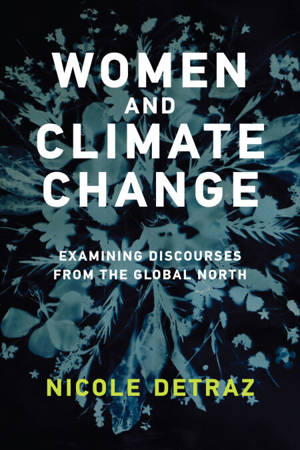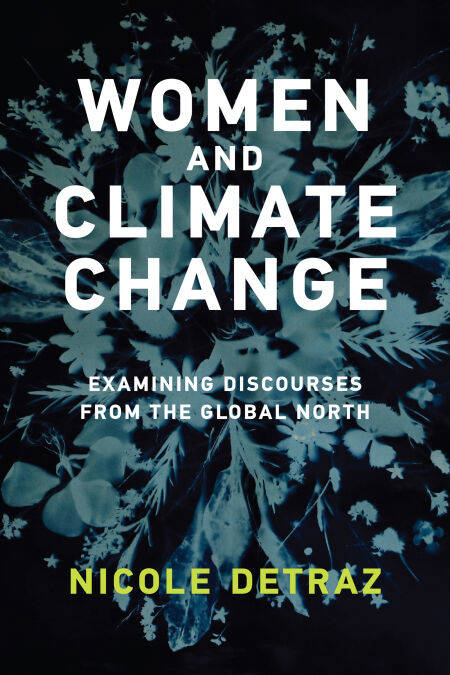
Bedankt voor het vertrouwen het afgelopen jaar! Om jou te bedanken bieden we GRATIS verzending (in België) aan op alles gedurende de hele maand januari.
- Afhalen na 1 uur in een winkel met voorraad
- In januari gratis thuislevering in België
- Ruim aanbod met 7 miljoen producten
Bedankt voor het vertrouwen het afgelopen jaar! Om jou te bedanken bieden we GRATIS verzending (in België) aan op alles gedurende de hele maand januari.
- Afhalen na 1 uur in een winkel met voorraad
- In januari gratis thuislevering in België
- Ruim aanbod met 7 miljoen producten
Zoeken
Women and Climate Change E-BOOK
Examining Discourses from the Global North
Nicole Detraz
E-book | Engels
€ 39,42
+ 39 punten
Omschrijving
How ideas of gender and climate change intersect with our path to a livable future.
When you think "climate change," who comes to mind? Who's doing the science, the reporting, the protesting, the suffering? In Women and Climate Change, Nicole Detraz asks where women in the Global North figure in the picture, what that means, and why it matters. Her answers fill critical gaps in what we know about the politics of climate change and gender.
Representations of climate change, like perceptions of gender, can make a profound difference in understanding expectations and actions around social, cultural, and political issues. Interviewing women living in the Global North who work in the climate change sphere, Detraz examines the crucial links between notions of climate change and gender—in particular, how women are portrayed in climate change debates. Where is their presence or absence recognized? What tasks are they expected to perform? What factors influence their roles? The answers provide a nuanced account of the characteristics, conditions, and positions associated with women's activities in and experiences of climate change—a multifaceted portrayal of women that also demonstrates the generalization and essentializing that can hinder goals of sustainability and gender justice.
Because gender is a social construction, Detraz reminds us, change is possible. Her book offers the suggestion, and the hope, that identifying connections between ideas of gender and climate change might also alter our vision of a livable future.
When you think "climate change," who comes to mind? Who's doing the science, the reporting, the protesting, the suffering? In Women and Climate Change, Nicole Detraz asks where women in the Global North figure in the picture, what that means, and why it matters. Her answers fill critical gaps in what we know about the politics of climate change and gender.
Representations of climate change, like perceptions of gender, can make a profound difference in understanding expectations and actions around social, cultural, and political issues. Interviewing women living in the Global North who work in the climate change sphere, Detraz examines the crucial links between notions of climate change and gender—in particular, how women are portrayed in climate change debates. Where is their presence or absence recognized? What tasks are they expected to perform? What factors influence their roles? The answers provide a nuanced account of the characteristics, conditions, and positions associated with women's activities in and experiences of climate change—a multifaceted portrayal of women that also demonstrates the generalization and essentializing that can hinder goals of sustainability and gender justice.
Because gender is a social construction, Detraz reminds us, change is possible. Her book offers the suggestion, and the hope, that identifying connections between ideas of gender and climate change might also alter our vision of a livable future.
Specificaties
Betrokkenen
- Auteur(s):
- Uitgeverij:
Inhoud
- Aantal bladzijden:
- 268
- Taal:
- Engels
Eigenschappen
- Productcode (EAN):
- 9780262362115
- Verschijningsdatum:
- 13/02/2023
- Uitvoering:
- E-book
- Beveiligd met:
- Adobe DRM
- Formaat:
- ePub

Alleen bij Standaard Boekhandel
+ 39 punten op je klantenkaart van Standaard Boekhandel
Beoordelingen
We publiceren alleen reviews die voldoen aan de voorwaarden voor reviews. Bekijk onze voorwaarden voor reviews.









